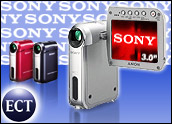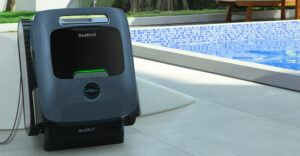
How small can a full-feature consumer camcorder get? Sony is certainly pushing the limits with its latest entry in its digital Handycam family of products.
The new unit, the DCR-PC55, not only fits in the palm of your hand, but you can practically hide it there. At 1.1-by-4.0-by-2.9 inches, it’s smaller than a compact cassette recorder and it weighs a feathery 10 ounces.
With lines sleeker than a whippet, the usual extensions and protrusions that tip-off observers of a video camera’s presence have been sanded from this MiniDV Handycam. The unit is a compact rectilinear package. You can slip it in a coat pocket without worrying about knobs, fobs and such snagging on your clothing when you pull it out-which should be often given its eminent portability.
Quality Components
The camera, which comes in three colors — silver, red and black — has a quality Carl Zeiss Vario-Tessar lens with a 10x optical zoom and 120x digital one. Video captured both indoors and out was sharp, and the unit’s automatic exposure and white-balancing systems rendered scenes with very good color fidelity.
In addition to capturing video in the common 4:3 aspect ratio, the Handycam will record in 16:9 wide mode, which gives your home movies that Hollywood look–as long as you have a TV that can display video in that format. Otherwise, your videos will have the “Elongated Man” look.
While the camera’s video was very good, its sound left a lot to be desired. It lacked crispness and definition.
A built-in lens cap covers the lens when the camera isn’t in recording mode.
One disconcerting aspect of the lens, though, is it has a very tight viewing angle. That means you need to keep your distance from your subjects to properly frame a shot.
With the lens recessed into the body of the camera, you have to be careful where you place your hands lest an a portion of an errant paw appear in a shot.
Super Steady
One problem I’ve found with small cameras is keeping them steady. But that wasn’t a nodus with this unit. Sony has incorporated it’s “Super SteadyShot” technology into this camera, and it works superbly.
If you distrust technology, you can always use a tripod with the camera. That mount can also be used with an optional grip that makes it easier to steady the unit.
As you might imagine with a camera this small, its controls are tiny, but the major ones — mode switching, record and zoom — although not expansive, can be operated with a minimum of fumbling after you acclimate yourself to their feel.
Moreover, the unit’s large three-inch LCD is also a touchscreen. Menu items appear on the display and you can choose them by poking them with your finger, a process that compensates for the camera’s munchkin buttons.
Touchscreen Iffy
My sentiments about touchscreens are conflicted. For a camera this size and someone with fingers my size, a touchscreen is a real boon. But I remain anxious about what the display will look like after prolonged poking with digits that more frequently than not are less than pristine.
Although the unit’s LCD is bright and sharp, it does wash out in bright sunlight. And since the camera doesn’t have an optical viewfinder, all you can do in those lighting conditions is guess how your shot is framed.
As has become mandatory in digital camcorders these days, the Handycam, which sells for from $700 to $800, has a still image mode. Images can be stored on a Memory Stick, Sony’s proprietary flash memory card. On the 16 megabyte card included with the camera, you can store 96 640-by-480-pixel images with fine compression and 240 images with standard compression.
A nice feature of this Handycam is that it includes a docking station. The station provides a quick way to connect the camera to a computer without hassling with cables. You can leave the dock connected to your computer and simply slip the camera in and out of the device.
Charging Dock
When not using the camera, you can leave it in the dock, which also acts as a charger.
The dock or camera can be connected to a computer via USB or FireWire connection, although only a USB cable is included with the unit. That’s a little annoying since in my experience, FireWire produces better transfers to a computer than USB.
With the DCR-PC55, Sony has created an exciting sub-palmcorder that doesn’t sacrifice size for features. Better yet, it has the potential to break down the can’t-bear-to- lug-a-camcorder-with-me barrier to shooting video.
John Mello is a freelance business and technology writer who can be reached at [email protected].






















































Question for author about this statement: "That’s a little annoying since in my experience, FireWire produces better transfers to a computer than USB."
I understand the importance of cables with analog communications, but I thought with digital either the signal is 100% there, or you have garbage. Is it a matter of speed or reliability you are referring to when you say "better"